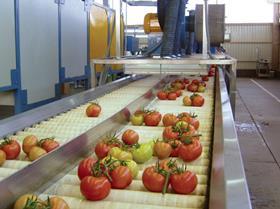
The Fresh Produce Association of the Americas (FPAA) has said that it is 'gratified' that the Unites States Department of Commerce and Mexican tomato growers have produced a new draft Tomato Suspension Agreement that will end the current duties on tomatoes exported from Mexico to the US.
At the same time, the FPAA is 'profoundly concerned' that a provision in the draft agreement appears to require inspections of up to 92 per cent of all lots of tomatoes from Mexico at the US border.
“At that level, the inspections are not only unnecessary, they also have the potential to destabilise the US tomato market,” said Lance Jungmeyer, president of the FPAA. “US importers and marketers of Mexican tomatoes will bear what amounts to punitive costs associated with such levels of inspection.
'Because of the sheer volume of tomatoes shipped north from Mexico to the US, we can expect the inspections to create substantial delays that compromise the quality, affordability and availability of tomatoes to American consumers and will create bottlenecks for other goods crossing the border,' he continued.
Jungmeyer added that, while FPAA commended the US Department of Commerce and tomato producers in Mexico for many months of intense negotiation to revise the Tomato Suspension Agreement, the association strongly urged both to consider their members’ concerns and those of many other American companies and consumers during the coming 30-day comment period.
The heightened inspections are slated to start about six months after the new Tomato Suspension Agreement, if it is finalised on 19 September.
“The inspection provision is essentially a non-tariff trade barrier whose ripple effects will not only damage the US tomato market but many other industries that trade with Mexico,” Jungmeyer said.
Tomatoes, he noted, make up almost 20 per cent of produce imports that flow from Mexico through the Nogales port of entry. Increasing the volume of tomatoes to be inspected there will only create bottlenecks for all goods at the border, he felt.
At the peak of the winter season tomatoes can comprise almost one-third of produce items on a given day. That will 'unnecessarily strain inspections on other imported items'.
FPAA has estimated that it will cost US$220m to construct the warehouse space needed for these enhanced inspections, as well as other related costs of close to US$50m per year.
Also, if the changes to the agreement are ratified, the reference price of Mexican organic tomatoes will likely rise by as much as 40 per cent more than the price of conventional tomatoes.
“We worry that the US market will not be able to bear this dramatic cost increase,” Jungmeyer said, adding that “it will almost certainly and dramatically reduce the availability of organic tomatoes for the many US consumers who prefer them.”
On 7 May, the Commerce Department, under strong pressure from a small number of Florida growers, withdrew from the Tomato Suspension Agreement that had been in force for 23 years and consistently protected US producers from potential dumping by their Mexican counterparts.
If the US and Mexico ultimately fail to ratify to the newly revised Agreement by 19 September, it will trigger a further series of anti-dumping investigations and the US duties on Mexican tomatoes will continue at 17.5 per cent and could rise to as much as 25.5 per cent.






No comments yet